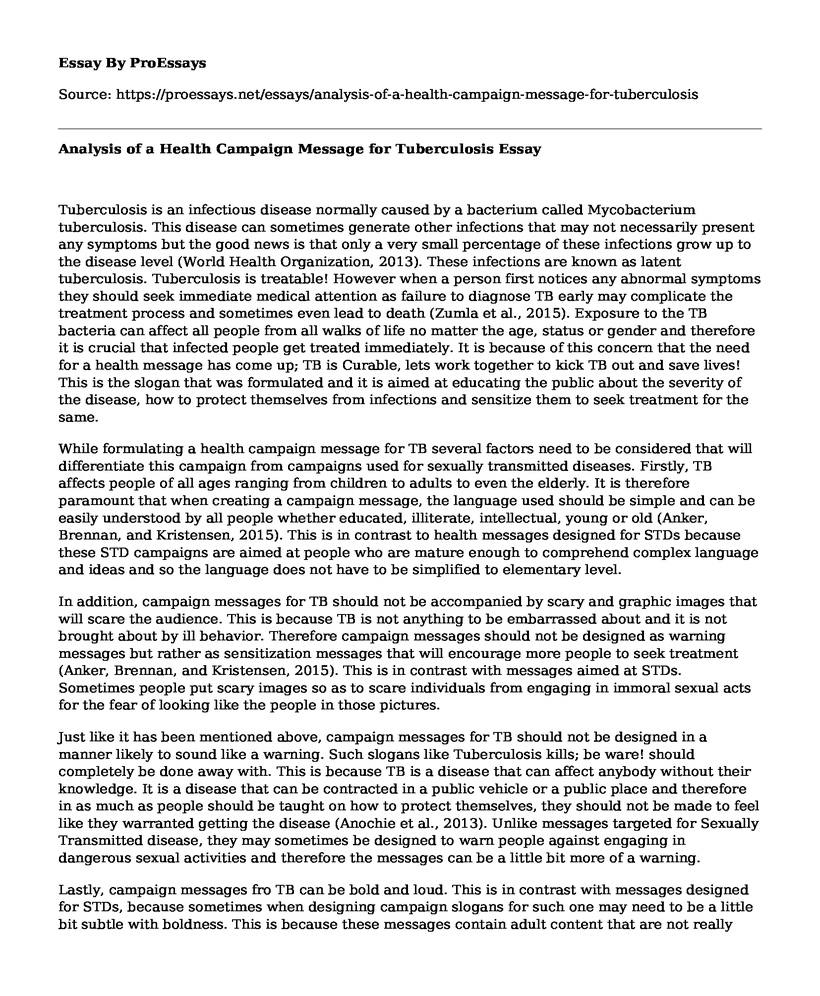Tuberculosis is an infectious disease normally caused by a bacterium called Mycobacterium tuberculosis. This disease can sometimes generate other infections that may not necessarily present any symptoms but the good news is that only a very small percentage of these infections grow up to the disease level (World Health Organization, 2013). These infections are known as latent tuberculosis. Tuberculosis is treatable! However when a person first notices any abnormal symptoms they should seek immediate medical attention as failure to diagnose TB early may complicate the treatment process and sometimes even lead to death (Zumla et al., 2015). Exposure to the TB bacteria can affect all people from all walks of life no matter the age, status or gender and therefore it is crucial that infected people get treated immediately. It is because of this concern that the need for a health message has come up; TB is Curable, lets work together to kick TB out and save lives! This is the slogan that was formulated and it is aimed at educating the public about the severity of the disease, how to protect themselves from infections and sensitize them to seek treatment for the same.
While formulating a health campaign message for TB several factors need to be considered that will differentiate this campaign from campaigns used for sexually transmitted diseases. Firstly, TB affects people of all ages ranging from children to adults to even the elderly. It is therefore paramount that when creating a campaign message, the language used should be simple and can be easily understood by all people whether educated, illiterate, intellectual, young or old (Anker, Brennan, and Kristensen, 2015). This is in contrast to health messages designed for STDs because these STD campaigns are aimed at people who are mature enough to comprehend complex language and ideas and so the language does not have to be simplified to elementary level.
In addition, campaign messages for TB should not be accompanied by scary and graphic images that will scare the audience. This is because TB is not anything to be embarrassed about and it is not brought about by ill behavior. Therefore campaign messages should not be designed as warning messages but rather as sensitization messages that will encourage more people to seek treatment (Anker, Brennan, and Kristensen, 2015). This is in contrast with messages aimed at STDs. Sometimes people put scary images so as to scare individuals from engaging in immoral sexual acts for the fear of looking like the people in those pictures.
Just like it has been mentioned above, campaign messages for TB should not be designed in a manner likely to sound like a warning. Such slogans like Tuberculosis kills; be ware! should completely be done away with. This is because TB is a disease that can affect anybody without their knowledge. It is a disease that can be contracted in a public vehicle or a public place and therefore in as much as people should be taught on how to protect themselves, they should not be made to feel like they warranted getting the disease (Anochie et al., 2013). Unlike messages targeted for Sexually Transmitted disease, they may sometimes be designed to warn people against engaging in dangerous sexual activities and therefore the messages can be a little bit more of a warning.
Lastly, campaign messages fro TB can be bold and loud. This is in contrast with messages designed for STDs, because sometimes when designing campaign slogans for such one may need to be a little bit subtle with boldness. This is because these messages contain adult content that are not really good for children and minors and they may want to be put on the low. Tb messages should be bold so that they can be received and partaken by people from all walks and groups of life without fear or shame (Sharma, and Mohan, 2013).
In conclusion, tuberculosis is a chronic ailment but the good news is that it has a cure. It is therefore important to come up with health messages that will prompt as many people as possible to get medical help. If mishandled, health messages can be responsible for pushing away people from getting help and feeling embarrassed but if tackled well, these messages can go a long way in encouraging people to take the step of seeking medication.
References
Anker, T. B., Brennan, L., & Kristensen, D. B. (2015, April). Truth in social marketing: applying truth frameworks to the strategic evaluation of social marketing campaigns. In World Social Marketing Conference, Sydney, Australia, April (pp. 19-21).
Anochie, P. I., Onyeneke, E. C., Onyeozirila, A. C., Igbolekwu, L. C., Onyeneke, B. C., & Ogu, A. C. (2013). Evaluation of public awareness and attitude to pulmonary tuberculosis in a Nigerian rural community. Germs, 3(2), 52.Sharma, S. K., & Mohan, A. (2013). Tuberculosis: From an incurable scourge to a curable disease-journey over a millennium.
World Health Organization. (2013). Tuberculosis. Saudi Medical Journal, 34(11), 1205-1207.
Zumla, A., George, A., Sharma, V., Herbert, R. H. N., of Ilton, B. M., Oxley, A., & Oliver, M. (2015). The WHO 2014 global tuberculosis report further to go. The Lancet Global Health, 3(1), e10-e12.
Cite this page
Analysis of a Health Campaign Message for Tuberculosis. (2021, Mar 25). Retrieved from https://proessays.net/essays/analysis-of-a-health-campaign-message-for-tuberculosis
If you are the original author of this essay and no longer wish to have it published on the ProEssays website, please click below to request its removal:
- Case Study Example: Choice of Supplier
- Applying for Jobs as a Nutritionist Paper Example
- Lapse of Ethics in Healthcare Paper Example
- Aging: Homeostenosis & Sleep Disorders - Essay Sample
- Essay Example on Breastfeeding: Essential Nutrients, Jaw Exercise, and Health Benefits
- Essay Example on Drug Use & Off-Label Prescriptions in Children: Risking Health?
- Faith-Based Nurses: Promoting National Health Objectives - Essay Sample







